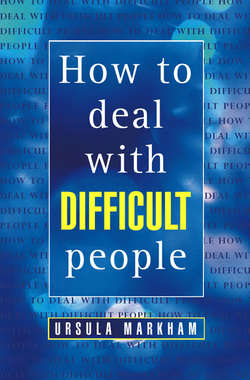Читать книгу How to Deal With Difficult People - Ursula Markham, Ursula Markham - Страница 22
The Aggressive Person
ОглавлениеThe aggressive person is the verbal bully, concerned only with satisfying his own needs, and frequently hurting other people in the process. (By the way, when I refer to ‘he’ ‘his’ or ‘him’ anywhere in this book please take it to mean either gender. No sexism is intended.)
The aggressive person enjoys the feeling of power that he thinks he has and the ability to make people rush about and do his bidding – but his enjoyment is often short-lived. He may never admit it but deep inside he knows that he is taking advantage of others who are either weaker than himself or in a position where they are unable to do anything about it – for example, when a manager is aggressive towards a very junior employee who is not able to retaliate without risking his job.
Convinced that he is the only one who could possibly be right in any situation and that the only needs that matter are his own, the aggressive person reminds others repeatedly of just how clever, strong or important he is. Just as physical bullying often hides a cowardly nature, this sort of boasting often masks feelings of inferiority or self-doubt. In addition to persuading others of his superiority, the aggressive person is also trying desperately to convince himself.
You will often find that the aggressive person is also a lonely person. His behaviour tends to drive others away in both his business and personal life. Because he has constantly to reassure himself and everyone around that he is the best, the most interesting and the most intelligent, he is excessively critical of everyone else. It is a great ego-booster for him to think that everything that goes wrong is someone else’s fault, but it does not make him very popular. Although he may feel a desperate inner need to have friends, he is unlikely to admit this; you have to treat friends as equals and he cannot allow himself to admit that anyone is worthy of such consideration.
Someone who is aggressive often has a great deal of energy and vitality. If only he could learn to harness that energy and use it positively, all would be well. Sadly, he tends to use it in a destructive way rather than a constructive one. Some people mistake aggression for strength and feel that if they display any other type of behaviour they will be taken for weaklings or will seem as if they do not know their own minds.
When aggression is taken to extremes it becomes violence (physical aggression). However, we will concern ourselves only with the verbal aggressor, with whom most of us are more likely to come into contact.
Not only does the aggressive person not really like himself, he also has a negative effect on all the people around him. These others may feel angry or frustrated because, while only too aware of the unfairness of his attitude, they are either powerless to do anything about it or resent having to waste their time and energy trying to defend themselves against his unjust accusations. This waste of energy, coupled with feelings of helplessness, is quite exhausting and often causes the aggressor’s ‘victims’ a great deal of stress and tension.
Even if those who come into the line of fire know perfectly well that the aggressor’s accusations and comments are unjust and uncalled for, they will not be able to help feeling hurt and even humiliated by them. No one likes to be made to appear foolish or to be corrected in front of others – and of course this is just what the aggressive person does. It adds to his sense of power if as many people as possible can hear him exerting his authority and putting down some other ‘inferior’ being.
Because anticipation of an event is often more stressful than the event itself, those who have to come into frequent contact with an aggressive person may feel that they are living on the edge of a volcano, always waiting for the next eruption. At the least this can cause them to feel anxious or inhibited; at worst it can lead to excess stress which in turn can bring about physical or mental illness. But of course the aggressor rather likes the fact that all around him are waiting for the other shoe to drop. It adds to his sense of power and authority.
Taking all this into account, it is hardly surprising that everyone tends to leave the aggressive person alone if they possibly can. This increases his feelings of isolation and of being ‘different’ or ‘special’, so he is likely to act in an even more aggressive fashion, thus perpetuating the cycle.
Anyone who comes into frequent contact with an aggressor will find no difficulty in identifying him at a glance, but here are some ‘give-aways’ in both verbal and body language which will point him out immediately even to a relative stranger.
